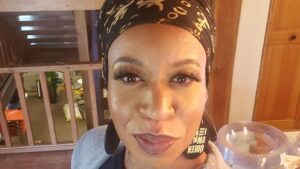
Talena Queen, English Teacher at Eastside High School and Calvary Member, Featured for Her Love First, then School Approach

Sometimes what happens is the scholar is writing on a topic that makes me think of a published poet who writes on the same topic. I introduce them to the poet’s writing and, whenever possible, the poet.
We also write poetic responses to texts that are assigned, and we find ways to infuse poetry into the lessons. It helps that I teach language arts.
Following years of disrupted learning, is there anything you’re doing differently this school year to help students catch up and heal?
I am teaching with love. Love first, then school. Love looks like understanding, kind words, praise for even the smallest things. Addressing scholars as scholars and adding “Sir” and “Ma’am” to that address. Love creates sincere feelings of safety. It prompts scholars to confide in me and want to get higher grades because they know they are valuable. Healing, I think, starts with love.
What’s your favorite lesson to teach and why?
The science of writing — that is my favorite lesson to teach. I made up the title. Basically, I’m teaching the scholars that they ought to memorize, I mean really know, the parts of an essay, the parts of a paragraph, and what kind of paragraph goes where. If we can get that part, the science of it, out of the way, then we can have space to write our ideas without angst. I want them to know the parts like they know their math facts. I start the lesson out with math facts that everyone knows: What’s three times three? What’s eight times one? Of course, everyone knows, but they’re confused about why I am asking that question in my class. I acknowledge that there is a part of the writing process that makes them want to cry. The hands fly up. The heads nod in agreement and some even blurt out, “That’s me!” I love this lesson because it is validating and helps to grow scholars into writers.
What’s something happening in the community that affects what goes on inside your classroom?
You know, we are all suffering from a list of traumas. I can barely talk about it without clearing the tears from my cheeks. I think we share these traumas with the nation, but it seems to me that the violence in our communities, that some people only read about, is in our neighborhoods. Our scholars see the street memorials every day. They know the people who are shot. They know the shooters. They see the stains on the grounds, they hear the stories, they know the stories and they carry the stories around with them inside their bodies. I think our scholars are becoming numb. They are escaping to handheld devices and virtual locations.
Let’s add on to the gun violence, the bomb threats, COVID-19, food insecurity, poverty, and the list goes on. The most important thing that I do in my classroom is give scholars a reason to smile and make them feel loved. Love makes the lessons possible.
Tell us about your own experience with school and how it affects your work today.
I had all the best teachers. They were creative, parental, really amazing teachers. I guess, I hadn’t thought of this before now, that my relationship with my teachers is the model for how I teach. They are grand-teachers now.
How do you approach news events in your classroom?
I often use a daily prompt that allows me to introduce news events. Some news events are imperative because we are all human and sharing the planet with each other. Some stories are worth the time. I don’t mind pausing the lesson plan to have a valuable discussion about the world we live in.
What’s the best advice you’ve ever received and how have you put it into practice?
The best advice I ever received was from my mom. She said, “Well, you don’t know before you try.” I try. I try to make a difference. I try things that I haven’t tried before. I try things that have never been tried by anyone before. I have adopted the belief that “I don’t know yet.”
My classroom is better because of the “yet” mindset. It allows me to look at every problem as a puzzle that I am capable of solving.
Catherine Carrera is the bureau chief for Chalkbeat Newark, covering the city’s K-12 schools with a focus on English language learners. Contact Catherine at ccarrera@chalkbeat.org .